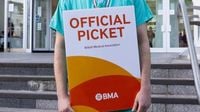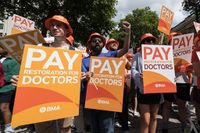In a significant announcement, the British Medical Association (BMA) has declared that resident doctors in England will be balloted for strike action over pay, raising the possibility of a summer filled with industrial action. The ballot is set to open on May 27, 2025, and will close on July 7, 2025. This decision comes after the BMA indicated that three weeks had passed since they warned the government about the "consequences of the absence of a reasonable, timely pay offer" for the upcoming financial year.
The term "resident doctor" is the new designation for what was previously known as junior doctors. This group comprises over 50,000 qualified doctors working in GP practices and hospitals across England, ranging from recent medical graduates to those with up to ten years of experience.
In a joint statement, co-chairs of the BMA’s resident doctors’ committee, Dr. Melissa Ryan and Dr. Ross Nieuwoudt, expressed their disappointment during a recent meeting with Health Secretary Wes Streeting. They stated, "Today we met with Wes Streeting and made clear that all he would have to do to avoid the need for a ballot was pledge to negotiate a fair deal that moved us toward pay restoration by 2027, in line with existing BMA policy. Unfortunately, he could not make this commitment." This lack of assurance has prompted the BMA to proceed with the ballot.
The BMA claims that basic pay for resident doctors has decreased by 22.3% in real terms since the 2008/2009 fiscal year. This figure is based on the Retail Prices Index (RPI) inflation, which measures average changes in the cost of goods and services that most households encounter. The co-chairs emphasized that resident doctors are determined to assert their value, stating, "Resident doctors are not going to be ignored. We are going to stand up for our value to the NHS and to patients, and we are going to fight to stay on the path set out for us by last year’s deal: restoration of our pay to the level of 2008. No doctor today is worth less than they were 17 years ago, and that is precisely what doctors voting 'yes' to industrial action will be telling the government. We don’t want to be in the situation where we have to fight over and over again for our worth – we would rather get on with our careers and our work caring for our patients.
The BMA has a history of industrial action, having taken such measures 11 times since 2022. NHS England estimates that these walkouts have resulted in nearly 1.5 million appointments being canceled or rescheduled. The most recent strike occurred from June 27 to July 2, 2025, just days before the general election.
In September 2024, BMA members voted to accept a government pay deal that promised an average increase of 22.3% over two years. This deal included a pay rise of between 3.71% and 5.05%, averaging 4.05%, for resident doctors, in addition to an existing pay award for 2023/24, which was backdated to April 2023. Each segment of the pay scale was uplifted by 6%, plus an additional £1,000, as recommended by the Review Body on Doctors’ and Dentists’ Remuneration (DDRB), effective April 1, 2024.
Despite these increases, the BMA insists that the current offer is insufficient. The co-chairs reiterated their stance, stating, "But our successful action over previous years shows clearly that if that is what we must do, then doctors are more than prepared to do it. The government does not have to go through what its predecessor did. It can instead act responsibly and tell us that it will be putting us back on the path to full pay restoration. If they can commit to that, we never need to even see a picket line form." This sentiment underscores the growing frustration among resident doctors regarding their pay and working conditions.
In response to the BMA's announcement, Danny Mortimer, chief executive of NHS Employers, expressed concern. He stated, "The government has taken welcome steps to accelerate pay review decision-making for annual pay awards and has acted more broadly to enhance employment and trade union rights across the economy. It is also developing a comprehensive plan for the NHS, its patients, and people. At the same time, there are profound challenges for public sector finances and the economy. In this context, NHS organisations will be alarmed by the BMA’s preparations to ballot on the outcome of the DDRB process. Health leaders would urge all trade unions, including the BMA, to prioritize dialogue with the government rather than industrial action. Such dialogue would absolutely need to reflect the very real concerns of NHS workers, but also to understand, in particular, the longer-term opportunities as we all work together to improve the health of the nation.
The Department for Health and Social Care has been approached for comment regarding these developments. The potential for strike action raises significant questions about the future of healthcare delivery in England, especially as both the BMA and government officials navigate this challenging landscape.
As the ballot date approaches, the pressure mounts on both sides to reach a resolution that satisfies the needs of resident doctors while ensuring the continuity of care for patients across the NHS. The outcome of this ballot will not only affect the doctors involved but also the millions of patients who rely on their care.






